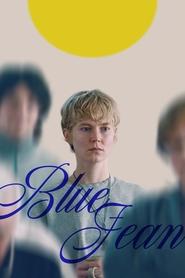Seattle International Film Festival 2023: Film #16
This film makes three brave choices, but like Jean herself, the film fails to be brave where it perhaps really matters. To start with, Blue Jean is brave enough to treat teenage girls' sexuality as a genuine force in their lives: not something to dismiss out of hand as being merely childish, nor a matter for male audience titillation… and never as simply the female equivalent of, say, all those farcical Philip Roth-like scenes of being caught masturbating in the family bathroom. In this way, Blue Jean was strongly reminiscent to me of Céline Sciamma's Water Lilies (2007).
Secondly, the film is brave to not to make a heroine out of Jean and make her character too sympathetic. This is made fairly explicit in the opening act with the double-whammy of Jean denying her relationship with Viv to her family, and then briefly taking out her frustration about doing so on her nephew in the bathtub. (Did anyone else spot the visual joke that equated the hetronormative TV dating show with the 'cartoon' that the nephew was allowed to watch before bed, perhaps a sly reference to Section 28's "pretended" family relationship?) Anyway, not making the protagonist 'Jean of Arc' was definitely the correct narrative choice for the film, for it gives it the latitude to depict incorrect moral choices on her part, and thus the film can take an implicit stand on what she and—by extension, we—might have done instead.
Lastly, Blue Jean is brave enough to show that it is not men but women—and white women in particular—who are at the vanguard of policing female sexuality. As in, it is women who are deputised by the patriarchy not only to ensure that other women stay within certain sexual and moral limits, but they are also tasked with the social reproduction of that policing role as well. Just to take one example, compare the rather feckless men at the party in the third act of Blue Jean (as well as the frothingly incoherent men on the news and radio clips throughout the film) with the crusading female colleague of Jean who insists on sitting in on her class and also to implicitly instruct the teenagers about how to enforce social norms. Remind anyone of the women-led 'gender critical' movement today?
But this is actually where it really starts to fall short. Blue Jean isn't brave enough to offer the viewer anything more than a caricature of anti-lesbian homophobia and, through its moral inverse—the lesbian support group—it also veers far too far into a gritty kind of feelgoodism. At many points, it felt almost too informed and self-satisfied by what happened in the following decades as well as what is happening in the world today. I'm not for a moment asking for the 'other side' of the argument to be debated, but the almost sheer lack of nuance was definitely a problem for this film, even though it led to some (relatively inexpensive) 'fuck yeah' revenge fantasy thrills.
Speaking of threes though, this was another film I absolutely loved watching as a Brit with an overwhelmingly American audience behind me. I think I was the only one in the screening room who grasped that Blue Jean was strongly alluding Byker Grove, a long-running and culturally resonant British soap opera aimed at young adults which tackled the 'social issues' of its day. Not only was Byker Grove also set in a Tyneside school, Blue Jean's male gym teacher is highly redolent of Byker's Geoff. More to the point, however, is that whilst Byker Grove was one of the first British children's TV shows to show a gay kiss, it never depicted a lesbian one… something that Blue Jean naturally attempts to redress.
Secondly, the choice of netball was another British institution that seemed to go over the heads of the audience as well. The letters on netball bibs actually denote a fixed role of that player in the game; unlike players in football, a player that has been proscribed to play, for instance, the position 'wing defense' is restricted to certain areas of the court. Needless to say, this limiting (yet somehow reassuring) angle of being assigned a fixed role at the beginning of a game maps directly onto the notoriously rigid British class system.
And finally, I had to stifle a loud laugh when the audience cringed at Jean making herself beans on toast out of a can. The US audience read this (entirely correctly) as a typically gross British meal, yet one that might represent a form of uncomplicated comfort food and self-care for Jean at an acute time of stress. Yet what all the Americans missed, however, is that this scene is actually depicting Jean being too depressed to put the cheese on top.

